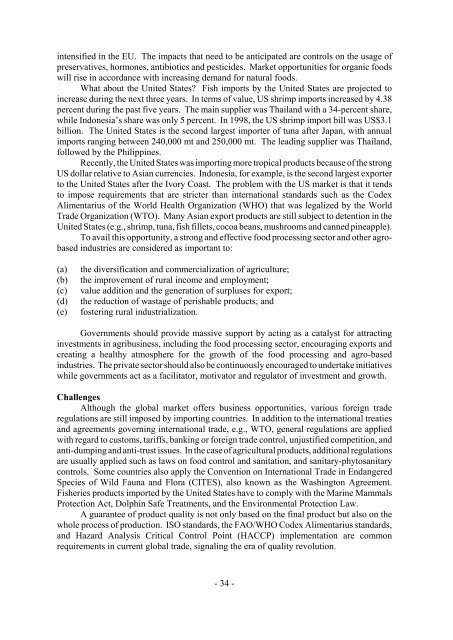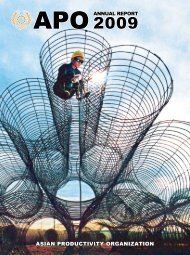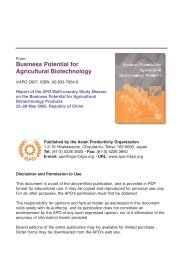Development of Agribusiness Enterprises - Asian Productivity ...
Development of Agribusiness Enterprises - Asian Productivity ...
Development of Agribusiness Enterprises - Asian Productivity ...
You also want an ePaper? Increase the reach of your titles
YUMPU automatically turns print PDFs into web optimized ePapers that Google loves.
intensified in the EU. The impacts that need to be anticipated are controls on the usage <strong>of</strong><br />
preservatives, hormones, antibiotics and pesticides. Market opportunities for organic foods<br />
will rise in accordance with increasing demand for natural foods.<br />
What about the United States? Fish imports by the United States are projected to<br />
increase during the next three years. In terms <strong>of</strong> value, US shrimp imports increased by 4.38<br />
percent during the past five years. The main supplier was Thailand with a 34-percent share,<br />
while Indonesia’s share was only 5 percent. In 1998, the US shrimp import bill was US$3.1<br />
billion. The United States is the second largest importer <strong>of</strong> tuna after Japan, with annual<br />
imports ranging between 240,000 mt and 250,000 mt. The leading supplier was Thailand,<br />
followed by the Philippines.<br />
Recently, the United States was importing more tropical products because <strong>of</strong> the strong<br />
US dollar relative to <strong>Asian</strong> currencies. Indonesia, for example, is the second largest exporter<br />
to the United States after the Ivory Coast. The problem with the US market is that it tends<br />
to impose requirements that are stricter than international standards such as the Codex<br />
Alimentarius <strong>of</strong> the World Health Organization (WHO) that was legalized by the World<br />
Trade Organization (WTO). Many <strong>Asian</strong> export products are still subject to detention in the<br />
United States (e.g., shrimp, tuna, fish fillets, cocoa beans, mushrooms and canned pineapple).<br />
To avail this opportunity, a strong and effective food processing sector and other agrobased<br />
industries are considered as important to:<br />
(a) the diversification and commercialization <strong>of</strong> agriculture;<br />
(b) the improvement <strong>of</strong> rural income and employment;<br />
(c) value addition and the generation <strong>of</strong> surpluses for export;<br />
(d) the reduction <strong>of</strong> wastage <strong>of</strong> perishable products; and<br />
(e) fostering rural industrialization.<br />
Governments should provide massive support by acting as a catalyst for attracting<br />
investments in agribusiness, including the food processing sector, encouraging exports and<br />
creating a healthy atmosphere for the growth <strong>of</strong> the food processing and agro-based<br />
industries. The private sector should also be continuously encouraged to undertake initiatives<br />
while governments act as a facilitator, motivator and regulator <strong>of</strong> investment and growth.<br />
Challenges<br />
Although the global market <strong>of</strong>fers business opportunities, various foreign trade<br />
regulations are still imposed by importing countries. In addition to the international treaties<br />
and agreements governing international trade, e.g., WTO, general regulations are applied<br />
with regard to customs, tariffs, banking or foreign trade control, unjustified competition, and<br />
anti-dumping and anti-trust issues. In the case <strong>of</strong> agricultural products, additional regulations<br />
are usually applied such as laws on food control and sanitation, and sanitary-phytosanitary<br />
controls. Some countries also apply the Convention on International Trade in Endangered<br />
Species <strong>of</strong> Wild Fauna and Flora (CITES), also known as the Washington Agreement.<br />
Fisheries products imported by the United States have to comply with the Marine Mammals<br />
Protection Act, Dolphin Safe Treatments, and the Environmental Protection Law.<br />
A guarantee <strong>of</strong> product quality is not only based on the final product but also on the<br />
whole process <strong>of</strong> production. ISO standards, the FAO/WHO Codex Alimentarius standards,<br />
and Hazard Analysis Critical Control Point (HACCP) implementation are common<br />
requirements in current global trade, signaling the era <strong>of</strong> quality revolution.<br />
- 34 -
















